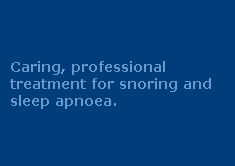Sleep Apnoea
Sleep apnoea (or sleep apnea, depending on which part of the world you come from) is derived from the Greek: a- without; and pnoia- breathing. As the name suggests, sleep apnoea describes a condition where the patient ceases to breathe while asleep.
This cessation in breathing can occur for one of two reasons. Most comonly, sleep apnoea is as a result of an obstruction to the airway. The obstruction is normally because the tongue, soft palate, uvula and/or soft tissue of the pharyngeal airway have relaxed or collapsed and blocked the flow of air.
The other form of apnoea is central apnoea. This is a rarer form of apnoea, but no less dangerous. People suffering from central apnoea do not have the normal breathing reflex of a healthy human and so do not draw breath as and when they should. This is a physiological rather than physical condition and requires extensive treatment.
Some patients suffer from a condition known as 'mixed apnoea' or 'complex apnoea', which describes a sleeping pattern where both obstructive and central apnoea occurs.
In all cases, the side effects and consequences of sleep apnoea are very serious and tend to worsen over time. For more information, visit Effects of Snoring & Apnoea.
If you suspect you or someone you know has any form of sleep apnoea, call 1300 246 637 to discuss the options with a friendly treatment coordinator, or complete the form below.

